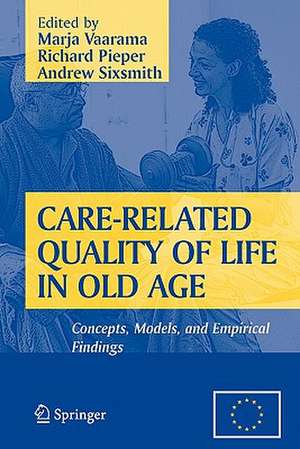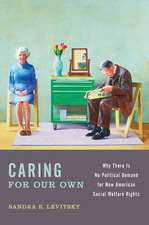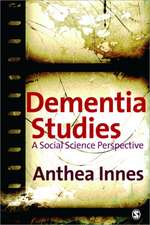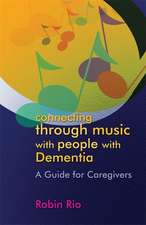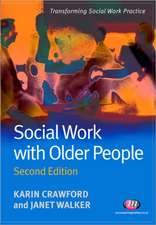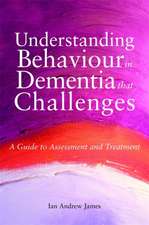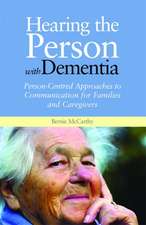Care-Related Quality of Life in Old Age: Concepts, Models, and Empirical Findings
Editat de Marja Vaarama, Richard Pieper, Andrew Sixsmithen Limba Engleză Paperback – 29 oct 2010
| Toate formatele și edițiile | Preț | Express |
|---|---|---|
| Paperback (1) | 718.82 lei 6-8 săpt. | |
| Springer – 29 oct 2010 | 718.82 lei 6-8 săpt. | |
| Hardback (1) | 723.57 lei 6-8 săpt. | |
| Springer – 30 noi 2007 | 723.57 lei 6-8 săpt. |
Preț: 718.82 lei
Preț vechi: 756.65 lei
-5% Nou
Puncte Express: 1078
Preț estimativ în valută:
137.55€ • 143.90$ • 114.26£
137.55€ • 143.90$ • 114.26£
Carte tipărită la comandă
Livrare economică 02-16 aprilie
Preluare comenzi: 021 569.72.76
Specificații
ISBN-13: 9781441924674
ISBN-10: 1441924671
Pagini: 352
Ilustrații: XIV, 338 p. 96 illus.
Dimensiuni: 155 x 235 x 18 mm
Greutate: 0.49 kg
Ediția:Softcover reprint of hardcover 1st ed. 2008
Editura: Springer
Colecția Springer
Locul publicării:New York, NY, United States
ISBN-10: 1441924671
Pagini: 352
Ilustrații: XIV, 338 p. 96 illus.
Dimensiuni: 155 x 235 x 18 mm
Greutate: 0.49 kg
Ediția:Softcover reprint of hardcover 1st ed. 2008
Editura: Springer
Colecția Springer
Locul publicării:New York, NY, United States
Public țintă
ResearchCuprins
Research Framework.- The General Framework and Methods of the Care Keys Research.- Instrumentation of the Care Keys Research.- Care Keys Data and Statistical Methods.- Theoretical Results.- The Concept of Care-Related Quality of Life.- The Concept of Quality of Long-Term Care.- Quality Management in Long-Term Care.- Empirical Results.- Subjective Quality of Life of Care-Dependent Older People in Five European Union Countries.- Quality of Life of Older Homecare Clients.- Quality of Life in Institutional Care.- Quality of Life and Dementia.- The Target Efficiency of Care—Models and Analyses.- Quality Management and the Care Keys Quality Matrix.- The Care Keys Toolkit.- Summary.- Care-Related Quality of Life: An Overview.
Recenzii
From the reviews:
"This book presents the findings of the Care Keys project, research that focused on quality of life in old age, especially persons who are vulnerable, frail, or disabled, carried out in Finland, Estonia, Sweden, and the U.K. … Professionals specializing in geriatrics and having a background in research process and tools will be most interested in this book. … The extensive reference lists at the end of each section are a valuable part of the book." (Sharon G. Thomas, Doody’s Review Services, February 2008)
"This book presents the findings of the Care Keys project, research that focused on quality of life in old age, especially persons who are vulnerable, frail, or disabled, carried out in Finland, Estonia, Sweden, and the U.K. … Professionals specializing in geriatrics and having a background in research process and tools will be most interested in this book. … The extensive reference lists at the end of each section are a valuable part of the book." (Sharon G. Thomas, Doody’s Review Services, February 2008)
Notă biografică
Marja Vaarama is Professor of Social Work and Social Gerontology at the University of Lapland, Finland. Her areas of research include quality of life in old age, quality and performance of long-term care for older people, gerontological social work, information technology for planning, evaluation and management of long term care for older people. She is the co-ordinator of the EU-funded Care Keys research project.
Richard Pieper is Professor of Urban Studies and Social Planning at the University of Bamberg, Germany. His main fields of research are in theory of social and regional integration and collective identity, and aging and technology, elderly care planning, and social and health care systems.
Andrew Sixsmith is Lecturer in Social Gerontology in the Department of Primary Care at the University of Liverpool. His current research interests focus on new technologies to facilitate the delivery of community health and welfare services.
Richard Pieper is Professor of Urban Studies and Social Planning at the University of Bamberg, Germany. His main fields of research are in theory of social and regional integration and collective identity, and aging and technology, elderly care planning, and social and health care systems.
Andrew Sixsmith is Lecturer in Social Gerontology in the Department of Primary Care at the University of Liverpool. His current research interests focus on new technologies to facilitate the delivery of community health and welfare services.
Textul de pe ultima copertă
It’s a core issue at the heart of elder care: while best-practice data exist for long-term care, quality of life as a concept, measure and standard for care outcomes remains elusive. The result of an ambitious European research initiative, the Care Keys Project addresses quality of life issues among frail, care-dependent seniors, taking their social as well as health needs into account. Care-Related Quality of Life in Old Age explains the theory behind Care Keys, its methodology, empirical findings, and practical considerations in promoting effective, efficient elder care aimed at social and emotional well-being and including disabled and cognitively impaired patients. This important book:
- Brings together gerontological knowledge from medical, psychology, nursing, sociology, economics, and health care systems perspectives.
- Introduces an integrated theory of care-related quality of life that emphasizes social, emotional and mental aspects as well as physical longevity.
- Presents a practice oriented framework for quality management of long-term care toward improving elders’ quality of life.
- Examines quality of life in home and long-term care settings across the five European member countries of Care Keys.
- Describes the Care Keys Toolkit, featuring innovative measures for monitoring and evaluating care and troubleshooting for problem areas.
Caracteristici
Includes new instruments for evaluation of care
